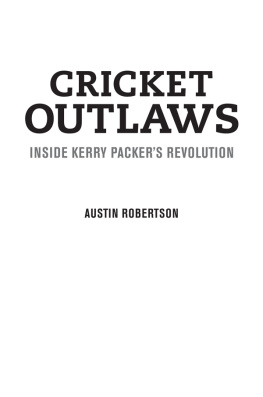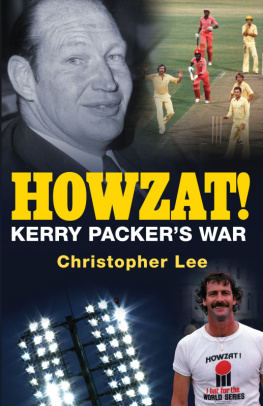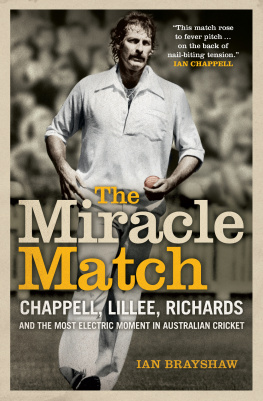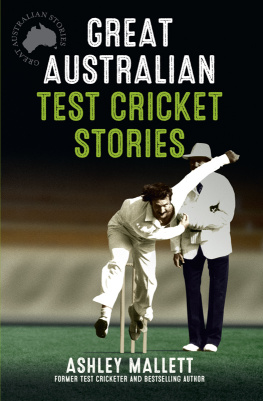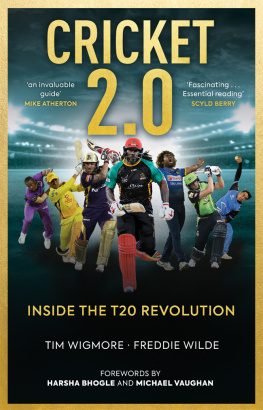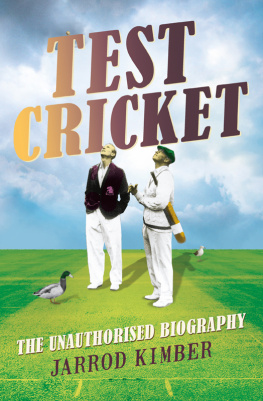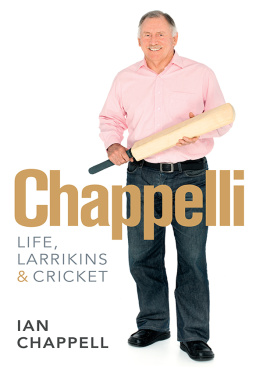About Cricket Outlaws
In the summer of 1977-1978 Kerry Packer changed professional sport forever.
Under a cloak of secrecy, the Aussie tycoon together with maverick TV comics Paul Hogan and John Strop Cornell, elite players Dennis Lillee, Tony Greig and Ian Chappell, and retired footy hero Austin Robertson signed up 35 of the worlds leading cricketers for a revolution called World Series Cricket.
Suddenly, the gentlemans game had four outlaw teams playing Supertests and 50-over games at night under lights in crash helmets, using white balls and wearing coloured clothing. Slowly, then in a torrent, fans fell under the spell of day-night cricket, airwaves jingling to Cmon Aussie Cmon and supercharged TV coverage led by Richie Benaud.
In the middle of this maelstrom was Austin Robertson: trusted lieutenant to Packer, and confidant to crickets biggest stars.
In Cricket Outlaws, Austin shared the real story of the World Series Cricket revolution for the first time from the inside, in his own words and with vivid first-hand accounts from 48 of the games biggest characters and key players behind the scenes, many speaking publicly on WSC for the first time.

CONTENTS
To Mum and Dad, my sister Susan and my daughters Nicola, Danielle and Jacqueline. And to Rich and Daph.
You made, and make, my world a better place just by being there.
FOREWORD
SHANE WARNE
WHEN AUSTIN ROBERTSON was inducted into the Australian Football Hall of Fame in 2015, the whole room was buzzing about the guests at his table.
There was former Australian cricket captain Allan Border. Daphne Benaud, beloved widow of Richie, was also at the table. And there was a bloke whose football career rose to the dizzying heights of one reserves game for St Kilda in 1988. That was me.
As each inductee into the Hall of Fame was introduced to the audience, their record was read out and they were interviewed by Gerard Whateley.
Austins record was impressive. In 279 games for Subiaco in the West Australian Football League (WAFL), South Melbourne in the Victorian Football League (VFL) and Western Australia in interstate games, he kicked 1315 goals at an average of 4.7 goals a game.
It was when Gerard and Austin had their chat that things started to get interesting. The usual ten-minute chat, with an old champ saying all the usual things, stretched to 15, 20, 25 minutes as Austin went for it with story after story after story. It was brilliant.
Because what most people in the room and the multitude tuning into the broadcast on Fox Sports didnt realise was that Austin had another story to tell. After football, he was one of the tiny circle at the very heart of the biggest bombshell ever to hit world cricket.
Austins intimate knowledge of the World Series Cricket revolution and the people in it is extraordinary. He knows everything how each of my cricket heroes came to join WSC, the science behind the drop-in pitches, the insider stories of the journalists and writers on the spot, and the true tales of the backroom boys from Kerry Packer to the guys who drove the trucks from city to city.
It makes what Austin has written and compiled in Cricket Outlaws the most unique insight yet into the event that changed Australian cricket history more than any other.
What Austin has done in this book, for the first time, is tell the real stories of World Series Cricket in the words of the only ones who really know it those who were there.
Austin has gathered the recollections of the WSC players themselves, and also the teams of entrepreneurs, managers, media and technical people behind the scenes, to tell the gripping and often hilarious story of the cat-and-mouse game that unfolded as the worlds best players signed up for Packers Circus under the noses of administrators and media.
He writes lovingly about big names including the Benauds, Greigs and Chappells, and insightfully of the man whose vision for the game and the players, and whose willingness to take on the establishment, made it all happen the late and great Kerry Packer.
Forty years on, the impact of the World Series Cricket revolution is still felt in every facet of our game. The people in this book changed the life of a seven-year-old kid in Ferntree Gully (me) forever, and Im not the only one whose world was shaken. Its one of the greatest cricket stories ever told, and Cricket Outlaws brings that story to vivid life.
I first met Austin Ocker Robertson during my first series playing for Australia way back in 1991/92. He became my manager not long after that and over the 25 years since weve become great mates.
I can tell you his biggest failing (hes got a few) is that in a sometimes dog-eat-dog world, Austin is one of those rare people who cares more for what hes doing, and the people hes doing it with, than he does for his own interests.
Thats not a great way to get rich but it does earn you some things more valuable than money: friendships and trust.
Thats why, all these years later, so many people involved in WSC have taken the time to contribute their memories and opinions to Austins book. Many of them have kept their thoughts to themselves for decades. But they trust Austin to tell their stories.
This book provides the remarkable story behind WSC and acknowledges the courage of the players who put their reputations and careers on the line for all cricketers and cricket nations to prosper. This action no doubt paved the way for the modern cricketer to earn a respectable income and transformed the game into a truly professional sport.
I was very proud and honoured to attend the AFL Hall of Fame dinner with Austin but, like all the contributors to Cricket Outlaws, its his friendship that means the most to me and my family.
Ock, I wish you all the best with this wonderful book congrats mate!
Lots of love.
Shane
INTRODUCTION
AUSTIN ROBERTSON
WE WERE AT THE Sydney Cricket Ground, on 28 November 1978. Cricket had just been struck by a lightning bolt, and it would never be the same again.
It was the first ever day-night One Day International at a recognised Test ground. Australia vs West Indies. And it was World Series Cricket.
A gargantuan, howling crowd was inside the arena and a big mob of happy but anxious fans were spilling across the surrounding streets, waiting to get in.
News got to Kerry Packer that the ground was full, yet people were still queued up in their thousands outside and the crowd in the sacrosanct Members Reserve was sparse.
The Big Fella, dressed in his shirtsleeves, took off for the Member Gates. I was right behind him.
As we approached the hallowed entrance, Kerry bellowed: Open the gates! Open the gates!
Two grey-coated attendants turned into pillars of salt they froze.
Open the bloody gates!
Kerry then took matters into his own hands. He made a snap decision to charge $10 for entry, and started a virtual stampede of humanity. These people were getting into the sanctuary of the Members Reserve, most likely for the first time in their lives.
Kerry actually manned the gates himself for five or 10 minutes, before handing over his post to Bruce McDonald, one of the staffers at WSC, and me.
After Kerry left, though, the situation became overwhelming.
Just let them in, I said.

